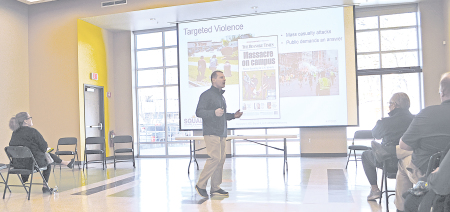Parking Space: A Love Story! Chapter 10 - Hector Gets Busy
Published:
February 5th, 2021
By:
Shelly Reuben

Shelly Reuben’s new novel is about … well, we’ll let you find out for yourself as we weekly serialize the chapters. If you miss one, get back up to speed with our article archive. Now, welcome to:
Parking Space: A Love Story!
Chapter 10 - Hector Gets Busy
We now reset our clocks to the morning of that same day.
Somewhat surprisingly, since Hector Van Hooft was as vindictive as he was autocratic, he did not take out his rage on Burgess “Mouse” Meekly at being banished from what he considered to be his parking space. This was odd since, by pulling out of their shared space an hour early, his timid neighbor had precipitated all of the subsequent events.
But after Hector and his car literally bounced off its impenetrable “force field,” as he had started to call it, the irate chef focused his anger on two other things. One: City Hall and/or the public officials who had permitted the outrage to occur. Two: Lilly Snow (although this came later) once he convinced himself that in some oblique way, it was all her fault.
Hector Van Hooft had been a busy boy.
After driving around for twenty-six minutes looking for a vacant parking space, he finally found one two blocks north of his building. He pulled in, slammed out of his car and, muttering imprecations against the gods, stomped through the snow and returned home at a little after 9:00 a.m.
He spent Monday morning fuming and cursing, until eventually—he was, after all, a night worker—he fell asleep. Later on at the restaurant, he brooded nonstop, cutting his finger while dicing walnuts and overcooking the sesame seared tuna, too angry, frustrated, and distracted to concentrate on his job.
By Tuesday morning, though. He had formulated a plan.
As always, at 7:00 a.m., he left work and drove home. He parked his car in the only space he could find, three blocks northeast of his apartment building, walked back, ascended to the third floor, and by 9:15 a.m., he was on the telephone.
Most large metropolises have non-emergency hotlines that people can call to complain about loud music, graffiti, potholes, derelicts loitering in lobbies, bicycles blocking fire escapes, and so on. In New York, Philadelphia, Los Angeles, and other highly populated areas, the department that handles these grievances can be reached by dialing 311 on a telephone.
The Big City also utilized this network.
On previous occasions, Hector Van Hooft had called 311 to report broken street lights, un-shoveled sidewalks, and neighbors who didn’t pick up after their dogs. He was as quick to file a complaint as was a baby to cry during a transcontinental flight, when all you wanted to do was sleep.
The 311 agent who took his call was Miracle Elsie Abbot.
Mrs. Abbot normally did only administrative work, but was manning the phones that Tuesday because the same flu epidemic that decimated Noah Pitt’s staff at Pitt-Goode Construction had left her working pretty much alone.
In one capacity or another, Mrs. Abbot had been an employee of The Big City for over sixty years. She started out as a postal clerk, got a master’s degree in social work, moved to Child Protective Services for a dozen years, and then happily settled in at the 311 Resource Hotline, where she eventually became a department head. Mandatory retirement for municipal employees of The Big City is sixty-seven, but an exception was made for Miracle who, at eighty-two, could outwork colleagues half her age, knew everything about everything (and everyone), and was loved by her co-workers.
Also because she had no intention of retiring.
Ever.
It was widely accepted that Mrs. Abbot would die on the job. However, until that date, her opinions and counsel were sought on issues ranging from dress codes (she enforced them in her department, even though doing so was illegal) to flag protocol (the U.S. flag is placed in a position of honor at the speaker’s right) to lunch room etiquette (it is impolite to refuse a colleague a seat at one’s table) and everything in between.
She preferred to show respect to the people with whom she worked, but was intolerant of slackers, self-promoters, and slobs. Even though, in her pearl necklace, clip earrings and floral print dresses, she looked like a church-going southern black lady circa 1950, she did not frequent any house of worship. She did occasionally attended religious festivities, but only as a courtesy to friends and relatives and because she loved a good party, regardless of the pretext.
Mrs. Abbot had high cheekbones, a determined chin, and eyes as sharp as the pins that an entomologist uses to pierce the wings of butterflies. She wore dainty straw hats in the summer, narrow-brimmed felt hats in the winter, and she carried an old-fashioned faux alligator handbag at all times.
Her advanced age was only noticeable from the wrinkles around her eyes and her scrawny neck, but even well into her 80s, it was clear to all with discriminating taste that she had been, and still was, stunning.
Mrs. Abbot had been married three times. Her first husband, Reginald Hoagland, a Marine, was killed in the Korean War. Her second husband, Elwood Dix, a fireman, died of heart disease when she was fifty-two. And her third husband, Algernon Abbot, twenty years her junior, was a professor of microbiology at Honesdale University. She had been married to him for thirty years.
Miracle Elsie Abbot was childless but very close to her grand-niece, Jane, who once complained that “your wardrobe makes you look like a mean old schoolmarm.”
To which Miracle Abbot replied, “I am aware of that, Jane.”
Her grand-niece gasped, “You mean you dress like that on purpose?”
Aunt Miracle said nothing, but she smiled shrewdly with a mischievous twinkle in her eye that left Jane both charmed and speechless.
I mention all this now, because Mrs. Abbot brought to the job everything that she was in her private life, including her values, her opinions, her dignity, and enough confidence to deal with belligerent callers in a manner that would be found nowhere in her Health and Human Services Employee Manual.
When Hector Van Hooft called 311 about a parking space, it was she who set the tone for The Big City’s response to his increasingly vociferous complaints.
Copyright © Shelly Reuben, 2021.
Author: Shelly Reuben - More From This Author
Comments








